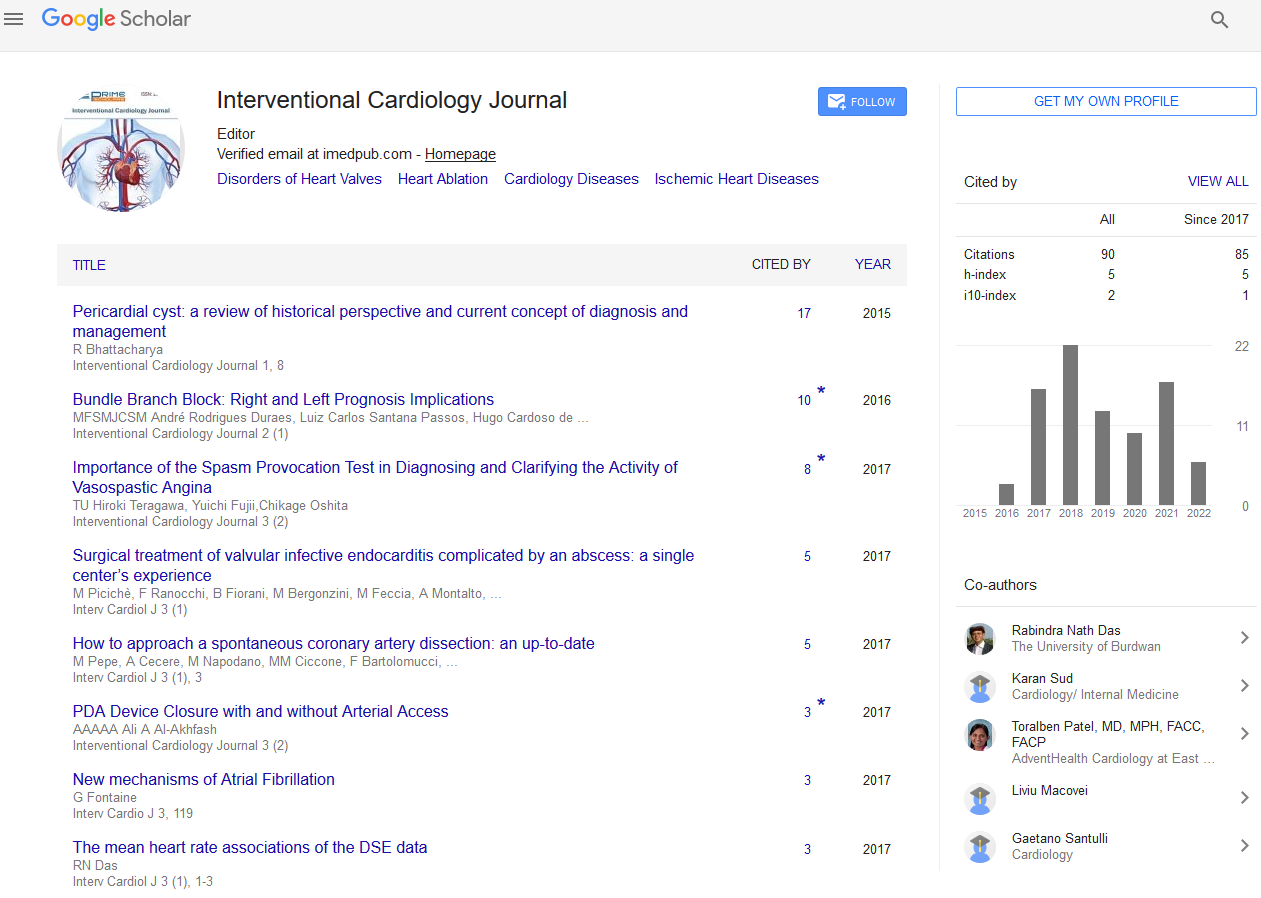Perspective - (2023) Volume 9, Issue 8
Stress Management and its Impact on Cardiovascular Health
Abdeslam Hamran*
Department of Health science, Lodz University of Technology, Lodz, Poland
*Correspondence:
Abdeslam Hamran, Department of Health science, Lodz University of Technology, Lodz,
Poland,
Email:
Received: 05-Jun-2023, Manuscript No. ipic-23-17749;
Editor assigned: 09-Jun-2023, Pre QC No. ipic-23-17749 (PQ);
Reviewed: 23-Jun-2023, QC No. ipic-23-17749;
Revised: 01-Oct-2023, Manuscript No. ipic-23-17749 (R);
Published:
28-Oct-2023, DOI: 10.21767/2471-8157.9.5.41
Introduction
The human cardiovascular system serves as the lifeline of our
bodies, tirelessly supplying oxygen and vital nutrients while
removing waste products. Yet, the prevalence of
cardiovascular diseases continues to rise, posing a significant
global health challenge. In this commentary article, we
explore the importance of cardiovascular health, the factors
contributing to its decline and the measures individuals and
society can take to nurture this essential aspect of our wellbeing.
Description
The importance of cardiovascular health is vital for overall
well-being. A strong cardiovascular system ensures efficient
blood circulation, maintaining optimal organ function and
providing the necessary resources for energy production. It
plays a crucial role in preventing various cardiovascular
diseases such as heart attacks, strokes and hypertension.
Moreover, a healthy cardiovascular system promotes mental
clarity, physical endurance and longevity, enabling individuals
to lead active and fulfilling lives. Several risk factors contribute
to the development of cardiovascular diseases. Unhealthy
lifestyle choices, such as poor diet, physical inactivity, tobacco
use and excessive alcohol consumption, significantly increase
the risk. Additionally, underlying medical conditions like
obesity, diabetes and high blood pressure further elevate the
susceptibility to cardiovascular diseases. Genetic
predispositions and a family history of such ailments can also
play a role. Promoting cardiovascular health requires a
multifaceted approach. First and foremost, adopting a hearthealthy
diet is crucial. Emphasizing whole foods, fruits,
vegetables, lean proteins and healthy fats while limiting the
intake of processed foods, sugary beverages and excessive salt
can significantly reduce the risk of cardiovascular diseases.
Regular physical activity, including aerobic exercises and
strength training, strengthens the heart and improves
circulation. Smoking cessation and moderation in alcohol
consumption are equally imperative. Tobacco smoking
damages blood vessels and increases the risk of clot
formation, while excessive alcohol intake can lead to high
blood pressure and heart muscle damage. Creating
awareness about these risks and providing support for
individuals seeking to quit smoking or reduce alcohol
consumption is vital. Managing stress levels is another
essential aspect of cardiovascular health. Chronic stress
contributes to elevated blood pressure and increases the
risk of heart disease. Engaging in relaxation techniques
such as meditation, yoga and regular sleep patterns can
alleviate stress and promote heart health. Community and
policy-level interventions are equally significant in fostering
cardiovascular health. Implementing public health measures
like taxation on unhealthy foods, promoting physical activity
in schools and workplaces and creating safe environments for
active transportation can encourage individuals to make
healthier choices. Healthcare systems should focus on
preventive measures, ensuring regular health screenings and
access to affordable medications for conditions such as
hypertension and diabetes.
Conclusion
Cardiovascular health is a fundamental aspect of overall wellbeing.
Nurturing our cardiovascular system through healthy
lifestyle choices, regular physical activity, stress management
and community-level interventions is crucial in preventing
cardiovascular diseases and promoting a healthier society. By
prioritizing cardiovascular health, we empower individuals to
lead longer, more fulfilling lives and alleviate the burden on
healthcare systems. Let us recognize the importance of our
cardiovascular lifeline and take proactive steps to safeguard
its well-being.
Citation: Hamran A (2023) Stress Management and its Impact on Cardiovascular Health. Interv Cardiol J. 9:41.
Copyright: © 2023 Hamran A. This is an open-access article distributed under the terms of the Creative Commons Attribution License, which permits unrestricted use, distribution and reproduction in any medium, provided the original author and source are credited.

